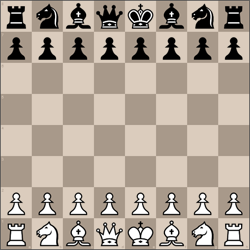< Prev Index Next >
 Chess 29 Jul 1920, Thu Brooklyn Eagle (Brooklyn, New York) Newspapers.com
Chess 29 Jul 1920, Thu Brooklyn Eagle (Brooklyn, New York) Newspapers.com
CHESS NEWS
By HERMANN HELMS.
Planning a Federation.
Leonard P. Rees, secretary of the British Chess Federation, writing in behalf of the executive committee of that body, which resumed its full functions with the Victory Congress at Hastings, and will hold its next meeting in McEwan Hall, University of Edinburgh, Aug. 9 to 21, announces that another effort will be made to form an International Chess Federation on the lines proposed early in 1914. Naturally, the war interfered with the furtherance of the scheme then promulgated, but now, on the eve of the most important international masters tournament since St. Petersburg and Mannheim of that ill-fated year, to be held at Gothenburg, Sweden, beginning Aug. 1, the time is ripe for the launching of the necessary propaganda in order to complete the undertaking that had to be abandoned under the force of uncontrollable circumstances.
Details of the scope of the proposed federation were published in full in the American Chess Bulletin for February, 1914, and to that journal, among others, Secretary Rees has addressed a friendly communication, inviting co-operation on the part of American chess players. It will be recalled that the original circular included a draft of a proposed set of conditions to govern matches for the championship of the world. In view of the existing state of affairs between Dr. Lasker and Capablanca, which technically might well be likened to a “stalemate,” and the further fact that there is by no means unanimity as regards Dr. Lasker's right to appoint his successor, thereby disregarding whatever claims any other aspirants might have, the suggestion to organize internationally is most timely, and there can be little doubt that Capablanca will be amenable to the authority of such a federation when properly organized.
The movement is also big with significance for this country and it is almost a foregone conclusion that the much-needed United States Chess Association will now spring into existence. As a matter of fact, this will be the natural sequence of the Eighth American Chess Congress, organized on July 21, at the conclusion of the Atlantic City Chess Congress, and, no doubt, will be one of the first matters of business to which the officers will give their attention. The Western Chess Association will be invited to co-operate, as well as State associations, leagues and leading clubs.
The text of the communication from Secretary Rees of the British Chess Federation follows:
THE BRITISH CHESS FEDERATION.
St. Aubyns, Redhill, Surrey, July 11, 1920.
Dear Sir--My committee are of opinion that the proposal made in 1914 to establish the above-named body can now be reviewed. I inclose copies of the proposed constitution then issued, which was generally approved by several national organizations, but could not be further dealt with on account of the outbreak of war.
It is a constitution based upon the following fundamental principles which my committee deem essential to success, viz..
1. Control by the great body of chess players all the world over on an equal national representative democratic basis and not by the chess masters, major or minor, self-styled or acknowledged alone.
2. The constitution to be framed apart from any question of international policy, such as the World's Championship conditions, international tournaments, status of chess masters, etc. Every such question must be left to the consideration and decision of the executive of the federation when properly constituted.
My committee asks that in the interests of the world's, chess you will support the adoption of the proposed constitution in order that an international chess federation may become an accomplished fact. Any additions or alterations that may afterward be found necessary or desirable can be made by resolution of the boards. I beg of you to let me hear as soon as possible the views of your organization on this proposal, and I await them with very great interest. Yours faithfully,
LEONARD P. REES, Secretary.
Moeller Attack Inadequate
Thanks to his knowledge of an adequate defense to the dangerous Moeller attack in the Giuoco Piano, E. S. Jackson of Philadelphia succeeded in defeating Stasch Mlotkowski in the final round of the masters tournament on the Million Dollar Pier, Atlantic City. By so doing he tied the Westerner for third and fourth prizes. The scores of this game and another from the tenth round are appended:























